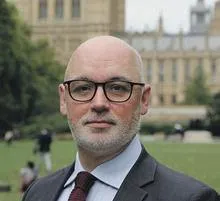
A call for Christian convicted civility
'It is a fact of public life that when it comes to religion and politics, the committed lack civility and the civil often lack conviction. And what we need is convicted civility' - Dr. Martin Marty.
I have long believed that this quote holds important truth for our age. In fact, ‘convicted civility’ has become something of a trademark phrase for me. CARE’s staff will exchange knowing looks when I use it in meetings, or whilst doing external media. I believe that Christians should be the preeminent embodiment of ‘convicted civility’ in the public square. Why?
Our goal is to speak truth, and to be people of confident faith; it is to apply our faith to every aspect of life, certain in God’s better story being true and good for every person. But while the gospel will cause offense, we should never seek to be offensive (Romans 1). Put another way, the ends never justify the means for a Christian.
But we do not honour God by ignoring what Jesus taught and how he lived his life. Our goal must also be to present God’s wisdom with humility, love, grace, and respect for others, especially those with whom we disagree. Our deep love for our neighbour means that, yes, we speak truth, but we always seek to do so with grace, and in love (Zech 8:16, Eph 4:15).
It is tempting, when the world’s tactics seem so effective, to justify using those same tactics for what we believe to be virtuous goals. Or we justify certain behaviours by seeking to compare ourselves to Jesus’ righteous anger and straight talking.
But when we adopt the world’s tactics, we disparage our own integrity and sacrifice our sanctification. How we do politics, and how we think and engage with political debates and activities, reveals much about where we place our trust and about who and what we wish to become.
If our goal is to become like the Lord Jesus, how is that achieved by denying every person – especially those who hold different views – with anything less than the dignity of being those who bear the image of God? How can my attitude towards those with whom we disagree not be transformed, when we remember that Jesus loved and died for them as much as me? Our witness is powerful, radical, and distinctive when we seek to live out Jesus’ teaching and example of loving our enemies, not just our friends.
Adopting political ‘dark arts’, suggests that we think the power of the Holy Spirit is insufficient, or that the world’s play book is more reliable than God’s word. When we make our priority winning arguments and seeing our desires, needs, and will win the day, it says something profound about us, that we are trusting in ourselves and in worldly powers more than in God’s plan, provision, and better story.
Looking to model convicted civility is a spiritual discipline that grows our own faith, for as John Stott wrote, 'our love grows soft if it is not strengthened by truth, and our truth grows hard if it is not softened by love.'
It is also our way of seeking the common good – a healthy public square.
Few can deny this is desperately needed. We live in a time when politicians and public figures are threatened and vilified for holding views that are counter cultural, or that disagree with vocal and active groups. Recent surveys suggest that half of us do not trust the government, and only 9% believe that politicians can be trusted to tell the truth. There is a sense that politics is broken, and the public square is toxic. We need light to guide us on a better way.
Our mission must be far greater, broader, and more ambitious than winning debates, or passing laws, important though these are. We are to be Christ-like in how we do politics, not just in what we seek from it.
So, what does Christian convicted civility look like? Well at the very least, it means we are for truth, for beauty, for listening, for respect and dignity; for kindness, conversation and accountability. And we are against falsehood, ugliness, ignorance, hate, abuse, cruelty, division, and self-righteousness.
Although this may sound like motherhood-and-apple-pie – a self-evidently ‘good’ list that no can disagree with – consider how it might look in your personal life and on a national scale.
Do we engage in conversation with those of other viewpoints humbly seeking to learn, or do we talk at others? Do we really love truth, even if it challenges our own standpoint, or do we want to stick to our own echo chamber’s talking points? What role does accountability play in promoting virtue – or is it a concept we only use when calling for those we disagree with to be silenced or sacked?
What does a beautiful public square look like, and what is our role in a beautification process that exemplifies and promotes the fruit of the Holy Spirit?
Christian convicted civility can be one of our greatest and most distinctive offerings to shape the public square for this and future generations. It is neither conditional on reciprocity nor on getting our own way. It is a remarkable, courageous, beautiful act of faithfulness and love for God and for our neighbour.
Find a range of resources to help you think, act, and pray before you cast your vote at CARE’s dedicated election website: engaGE24
Ross Hendry is CEO of Christian Action Research and Education (CARE)